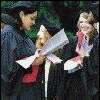 |
REPORTERS AND EDITORS NOTE: TWO STUDENTS IN THIS PROGRAM ARE AVAILABLE TO SPEAK TO THE MEDIA.YORK UNIVERSITY UPGRADING PILOT PROGRAM HELPS PUT FOREIGN-BORN TEACHERS BACK INTO THE CLASSROOM TORONTO, June 12, 1996: Although the public hears about immigrant professionals driving taxis because Canada doesn't recognize their credentials, a York University program is helping immigrant teachers get back into the classroom. The Upgrading Pilot Program, part of York University's Faculty of Education, allows teachers trained outside Canada an opportunity to gain practical and theoretical knowledge of the Ontario school system in a part-time program. These students, whose credentials were evaluated by the Ministry of Education before they entered the program, will graduate on Wednesday, June 19, 1996, at 7:00 p.m., York University Faculty Club, Room S-166, South Main Floor, Ross Building. York University's Faculty of Education began this Upgrading Pilot Program in January, 1996. It is partially funded by the Ministry of Education's Teacher Education Initiatives. The course takes place two nights weekly at York, with an additional minimum 15-day in-class placement. The program is unique because it gives teachers trained outside Canada opportunities to learn about teaching methods and philosophies related to teaching in the primary and junior divisions, firsthand experience in an Ontario classroom and improved English-language communication skills. The inaugural pilot program, held at York in 1995, was praised by its graduates. Many said it had allowed them to meet criteria for their Letter of Eligibility while learning a great deal about the Ontario school system. This year's course -- with 20 students from India, Jamaica, Taiwan, Somalia and the former Yugoslavia -- is almost over. The students have done classroom placements with the Etobicoke, North York, Toronto, Scarborough and York Region Boards of Education. They speak of the confidence they have gained and the amount they have learned. "When I started, I was a little worried about the program," says current student Balneet Singh. Singh obtained her bachelor of science and bachelor of education degrees in India. She was both a teacher and school principal in Nigeria. Although she won't graduate until next week, she has already lined up a summer teaching assistant job with the City of York School Board. "I'm really happy. This program is an essential tool for foreign-trained teachers before they settle into the Canadian teaching environment. Now I can enter the classroom and I know I can handle it." Mohamud Musse was a teacher with 15 years experience at both the high school and elementary school levels in his native Somalia. He has both a bachelor of science degree in mechanical engineering from a Somali university and a diploma in education from the University of Manchester in England. But he has been unable to teach since his arrival in Canada in 1990, working instead on a variety of jobs: machine operator; Somali- language radio broadcaster in Canada and for the Voice of America; and director of the Somali-Canadian Association of Etobicoke. Teachers in Ontario schools act as facilitators, which is a big difference from Somali schools, he says. "Back home we went to the blackboard and wrote everything down but our materials were limited. One advantage I found very interesting here is that the decisions are in the hands of the students and the teacher gives them guidance. This course really helped me to understand the Canadian model." Since enroling in this program and speaking enthusiastically of it, many other members of the local Somali community have approached him about how they can get into a similar program, he says. Musse says he is now waiting for the results of a job interview with a local board of education. A similar program was offered on a full-time basis at the University of Ottawa during the 1994/95 academic year. The program at York is the first part-time program, says associate dean of education Dennis Searle. The advantage of a part-time program is that people can attend it and still carry on their daily work and living schedule. "Given the changing nature of classrooms in Ontario, it is important to have teachers who represent and understand the diverse experiences which many of the students bring to the class," Searle adds. "This program represents a way of integrating people with a teaching background into Canadian society." "By integrating class work with actual teaching experiences, participants develop confidence and recognize the contribution that they make to school life," says program coordinator Lesley Miller. "The program is particularly valuable because it prepares teachers who have worked around the world to bring their expertise to Ontario classrooms." "The Upgrading Pilot Program is one of a series of related innovations recently introduced by York's Faculty of Education," says Faculty of Education dean Stan Shapson. "These programs, spanning future teachers' clubs in high school to research on literacy, math and science, have been introduced to answer the call for change so that the teaching force and curriculum is more responsive to the educational needs in our urban schools of today." York University, the third largest in Canada, is nationally and internationally respected for its innovative research and teaching. With its combination of dedicated and talented faculty, bright and ambitious students, dynamic curriculum and modern campus in the heart of one of North America's most influential urban centres, York University is setting the modern standard in academic excellence. -30- For more information, contact:
Dennis Searle or
Cindy Kleiman
|
|
|
| | Welcome to York University | Latest Release | Release Archives | |
![[to York's Home Page]](../../images/yorklogos.gif)
